Maggi
Maggi (IPA: [ˈmaɡi] or similar in many countries, IPA: [ˈmaddʒi] in others) is an international brand of seasonings, instant soups, and noodles that originated in Switzerland in late 19th century. The Maggi company was acquired by Nestlé in 1947.
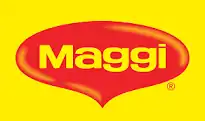 | |
| Type | Food |
|---|---|
| Founded | 1884 |
| Founder | Julius Maggi |
| Parent | Nestlé |
| Website | www |
History
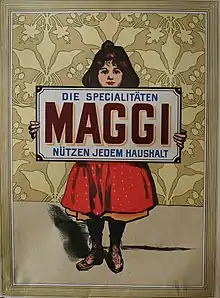
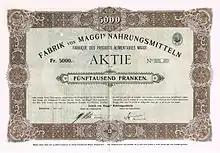
The company originated in Switzerland in 1884, when Julius Maggi took over his father's mill. He quickly became a pioneer of industrial food production, aiming to improve the nutritional intake of worker families. Maggi was the first to bring protein-rich legume meals to the market, and followed up with a ready-made soup based on legume meals in 1886. After that Julius Maggi introduced bouillon concentrates, first in capsules, then in cubes. In 1897, Julius Maggi founded the company Maggi GmbH in Singen, Germany.[1]
In 1947, following several changes in ownership and corporate structure, Maggi's holding company merged with the Nestlé company to form Nestlé-Alimentana S.A., currently known in its francophone home base as Nestlé S.A.[2]
Products
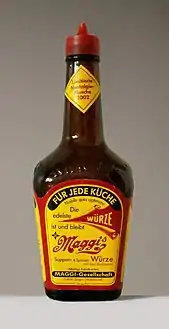 Maggi Seasoning sauce (replica of a historic bottle)
Maggi Seasoning sauce (replica of a historic bottle)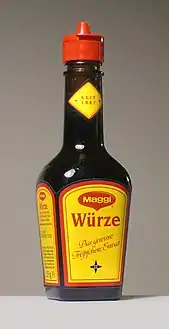 A bottle of Maggi sauce in 2006
A bottle of Maggi sauce in 2006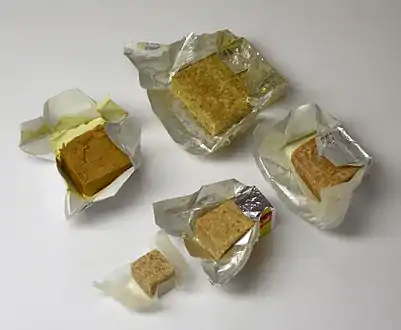 Bouillon cubes
Bouillon cubes
Cube
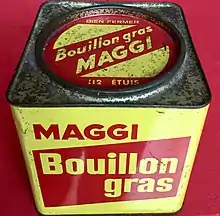
The bouillon cube or Maggi cube is a meat substitute product that was introduced in 1908.
In Germany, Cameroon, Côte d'Ivoire, Bénin, Gambia, Sénégal, Guinea, Nigeria, Ghana, Burkina Faso, Togo, Sierra Leone, Liberia, Mali, Niger, and Mauritania and parts of the Middle East, Maggi cubes are an integral part of the local cuisine. In Haiti and throughout Latin America, Maggi products, especially bouillon cubes, are widely sold with some repackaging to reflect local terminology.[3] In the German, Dutch, and Danish languages, lovage has come to be known as Maggi herb (Ger. Maggikraut, Du. maggikruid or maggiplant, Da. maggiurt), because it tastes similar to Maggi sauce, although lovage is not present in the sauce.
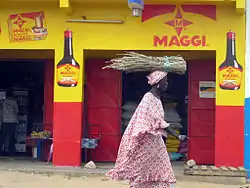
Seasoning sauce
In Romania, Mexico, German-speaking countries, the Netherlands, the Czech Republic, Slovenia, Poland and France, "Maggi" is still synonymous with Maggi-Würze (Maggi seasoning sauce), a dark, soy sauce-type hydrolysed vegetable protein-based condiment sauce. In Spain and Mexico, it is sold under the name Jugo Maggi.[4] There are a total of nine different formulations, which differ between nations and/or regions.
Noodles
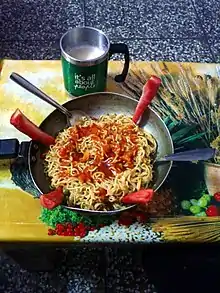
Maggi instant noodles are popular in Bangladesh, Pakistan, Nepal, Singapore, Malaysia, Australia, New Zealand, and India and are synonymous with instant noodles in most of these countries. Nestle has 39% market share in Malaysia,[5] and had 90% market share in India prior to a nationwide ban by the Food Safety and Standards Authority of India. Following the ban, the market share was reduced to 53% in India.[6] In Malaysia and Singapore, fried noodles made from Maggi noodles are called Maggi goreng. Maggi Instant noodles are branded as "Maggi 2 Minute Noodles" in Australia, New Zealand[7] and India.[8]
In India, Maggi Masala noodles carry a green dot, meaning they are specifically formulated to serve vegetarians. However, Maggi chicken noodles carry a red dot, indicating that they are not vegetarian.[9] This special formulation is not available in other countries, unless imported from India.
In Philippines, localized versions of Maggi instant noodles were sold until 2011 when the product group was recalled for suspected salmonella contamination.[10][11] It didn't return to market, while Nestle continues to sell seasoning products including the popular Maggi Magic Sarap.
Recipe mixes
Recipe mixes or so called Fixes were introduced in Germany in 1974. The product offers to the consumers an idea and a recipe to cook with two or three fresh ingredients and a Maggi mix. A complete step-be-step recipe is given on the back of pack. Following the recipe guarantees the result. These products were originally launched in Germany, where they became very popular, and some Western European countries. In the 1990s, recipe mixes were introduced in Eastern Europe, particularly in Russia and Poland (under the Winiary brand), where they became a big success. Nowadays, the portfolio of recipe mixes offer consumers more than 100 recipe ideas across different European countries.
Maggi noodles safety concerns in India
In May 2015, food safety regulators from Barabanki, a district of Uttar Pradesh, India reported that samples of Maggi 2 Minute Noodles had unexpectedly high levels of monosodium glutamate (MSG), as well as up to 17 times the permissible limit of lead. This finding led to multiple market withdrawals and investigations in India and beyond.[12][13][14][15][16]
Timeline
- 3 June 2015 – The New Delhi Government banned the sale of Maggi in New Delhi stores for 15 days due to these findings.[17] First Information Reports (FIRs) against Bollywood Maggi Brand Ambassadors Amitabh Bachchan, Madhuri Dixit, and Preity Zinta were lodged by Sudhir Kumar Ojha, a lawyer, at Muzaffarpur district court, asking the authorities to arrest them if required. He complained that he fell sick after eating Maggi which he had purchased from a shop at Lenin Chowk on 30 May.[18]
- 4 June 2015 – The Gujarat FDA banned the noodles for 30 days after 27 out of 39 samples were detected with objectionable levels of metallic lead, among other things,[19] and Assam banned sale, distribution, and storage of Maggi's "extra delicious chicken noodles" variety for 30 days after tests carried out at the state public health laboratory concluded that the particular variety contained added an excessively high amount of lead.[20] On 4 June 2015 the government of Tamil Nadu banned Maggi foods due to an unacceptable amount of lead and other components.[21]
- 5 June 2015 – The Andhra Pradesh Government also banned Maggi foods.[22]
- Also on 5 June 2015, the Food Safety and Standards Authority of India (FSSAI)[23] ordered a recall of all nine approved variants of Maggi instant noodles and oats masala noodles, suggesting that they were unsafe and hazardous for human consumption.[24] On the same day, the Food Standards Agency of the United Kingdom launched an investigation into the level of lead in Maggi noodles.[25]
- 6 June 2015 – The Central Government of India banned nationwide sales of Maggi noodles for an indefinite period.[26]
- 26 June 2015 – During a press meeting, the Minister for Health and Family Welfare of Karnataka, U. T. Khader, stated that Maggi foods would not be banned.[27]
- July, 2015 – The Bombay High Court allowed the export of Maggi while the ban in India remained.[28]
- August 2015 – Tests performed by the US health regulator FDA showed no dangerous lead levels in the products.[29] On 13 August 2015, the nationwide ban was struck down by the Bombay high court.[30] The court stated that proper procedure was not followed in issuing the ban and called into question the test results, as the samples were not tested at authorized laboratories accredited to the National Accreditation Board for Testing and Calibration Laboratories (NABL).[31]
- January 2019 - Maggi instant noodles were again under the scanner for lead content in the noodles.[32]
Additional market bans
Some of India's biggest retailers (including Future Group's Big Bazaar, Easyday, and Nilgiris) imposed a nationwide ban on Maggi.[33] In addition, multiple state authorities in India found an unacceptable amount of lead, leading to bans in more than 5 other states.[34][35]
Nepal indefinitely banned Maggi over concerns about the lead levels in the product.[36] Maggi noodles were subsequently withdrawn from the market of five African nations: Kenya, Uganda, Tanzania, Zimbabwe and South Sudan.[37]
Testing controversies
- Monosodium glutamate (MSG): Testing found some MSG in Maggi noodles. The packet stated "No added MSG"; however, MSG naturally occurs in hydrolyzed peanut protein, onion powder, and wheat flour. Maggi offered to remove the words "No added MSG" from the package to overcome the objection.[38]
- Lead: Maggi noodles include flavouring packets named "Tastemaker" which is intended to dissolve in water during cooking. Maggi insisted that testing should be done on the product as it is eaten, however, the FSSAI insisted that the powder itself should be tested. On 5 June, the FSSAI said that the prescribed standards of 2.5 parts per million would have to apply to all components of the product. Out of the 13 samples tested by Delhi authorities, 10 of them had lead content exceeding this limit. The packets that initiated the investigation from Uttar Pradesh had 17.2 ppm of lead.[39] Nestlé also questioned the reliability of the labs used. Results from testing outside of India (Singapore,[40] US[29]) reported that Maggi noodles were safe. In the later Bombay High Court judgment, the court agreed that the test results by earlier labs were unreliable. The court mandated testing to be done at three specific laboratories (Punjab, Hyderabad, and Jaipur) where Maggi was found safe.[41] The lead may have been naturally occurring in plants and soil[42] or from Indian spices, although within acceptable limits.[43]
Company response
Maggi always insisted that their noodle product is safe.[44] Maggi recalled stock worth nearly ₹320 crore (₹3.2 Billion) from the shelves and paid ₹20 crores (₹200 million) to a cement factory to burn the product. In addition, the Corporate Affairs Ministry of India imposed a ₹640 crore (₹6.4 Billion) fine on Nestle India for the presence of MSG and lead beyond the permissible limit.[45]
Return to market
In India, Maggi products were returned to the shelves in November 2015,[46][47] accompanied by a Nestlé advertising campaign to win back the trust of members of the Indian community.[48] At this time, the "Maggi anthem" by Vir Das and Alien Chutney became popular.[49] Nestlé resumed production of Maggi at all five plants in India on 30 November 2015.[50][51]
Criticism
Nestlé has faced criticism of its advertising not adhering to marketing regulations in developed countries, and for making misleading claims in developing countries. In October 2008, Nestlé aired a commercial meant for Bangladeshi television on British TV. The advert made false claims that the noodles would "help to build strong muscles, bone, and hair". The British Advertising Standards Authority stated that the advertisement did not abide by the new EU consumer protection legislation, by which advertisers have to provide proof of health claims.[52]
See also
- List of instant noodle brands
- List of Nestlé brands
 Food portal
Food portal
References
- "History of Maggi". nestle.com. Retrieved 7 August 2017.
- "FOOD HISTORY: History of Maggi brand of Nestlé". world-foodhistory.com. Retrieved 4 February 2016.
- Albala, Ken (2011). Food Cultures of the World Encyclopedia. Santa Barbara, Calif.: Greenwood. p. 166. ISBN 9780313376276. Retrieved 16 January 2016.
- "Seasoning Sauce | Maggi® | Brands & Offers | Nestlé Recipes". ElMejorNido.com. Archived from the original on 26 December 2017. Retrieved 16 January 2016.
- "Noodles in Malaysia". Euromonitor.com. Retrieved 16 January 2016.
- "Noodles in India". Euromonitor.com. Retrieved 17 January 2016.
- "MAGGI 2 Minute Noodles Chicken - 2 Minute Noodles - MAGGI Australia". maggi.com.au. Retrieved 12 January 2018.
- "MAGGI 2 Minute Noodles". maggi.in. Retrieved 8 March 2020.
- "Maggi controversy: It's a wake-up call for Indian consumers | columns". Hindustan Times. 6 June 2015. Retrieved 16 January 2016.
- "Maggi noodles recalled over salmonella scare". ABS-CBN News. 5 May 2011. Retrieved 22 November 2020.
- "Nestle recalls Maggi noodles due to salmonella contamination". ABS-CBN News. 5 May 2011. Retrieved 22 November 2020.
- "Maggi controversy: Nestle India may be in loss again". Retrieved 16 August 2015.
- "Doubts over MSG and Lead Content in Maggi Instant Noodles | Merofact Awareness Blog". Merofact.blogspot.in. 19 May 2015. Retrieved 16 January 2016.
- "Beware! Eating 2 -Minute Maggi Noodles can ruin your Nervous System". news.biharprabha.com. 18 May 2015. Retrieved 18 May 2015.
- "Maggi Noodles Packets Recalled Across Uttar Pradesh, Say Food Inspectors: Report". New Delhi, India: NDTV. 20 May 2015. Retrieved 20 May 2015.
- Sushmi Dey (16 May 2015). "'Maggi' under regulatory scanner for lead, MSG beyond permissible limit". The Times of India. Retrieved 20 May 2015.
- "Delhi govt bans sales of Maggi from its stores: Report". The Times of India. New Delhi, India. 3 June 2015. Retrieved 3 June 2015.
- Tewary, Amarnath (3 June 2015). "Maggi case: Bollywood actors face FIR". The Hindu. Retrieved 16 January 2016.
- "Gujarat bans Maggi noodles for 30 days". The Times of India. The Times Group. Indo-Asian News Service. 4 June 2015. Retrieved 4 June 2015.
- "Timesofindia.indiatimes.com is temporarily unavailable". The Times of India.
- The author has posted comments on this article (5 June 2015). "Centre may ban Maggi as other brands fail test in TN". The Times of India. Retrieved 16 January 2016.
- "Andhra Pradesh bans maggi, Telangana awaits report". Deccan Chronicle. 6 June 2015. Retrieved 16 January 2016.
- Rajagopal, Krishnadas. "Did not order Maggi ban, FSSAI tells SC". The Hindu. Retrieved 26 February 2017.
- "FSSAI Order to Nestle India" (PDF). FSSAI, India. 5 June 2015. Archived from the original (PDF) on 16 June 2015.
- "UK launches Maggi tests for lead content – The Economic Times". The Economic Times. 5 June 2015. Retrieved 16 January 2016.
- "Supreme Court denies to give clean chit to Maggie, orders to re-test".
- News Karnataka (27 June 2015). "Maggi will not be banned in Karnataka". Newskarnataka.com. Retrieved 16 January 2016.
- Maulik Vyas, ET Bureau 1 July 2015, 03.59AM IST (July 2015). "Bombay HC allows Nestle to export Maggi though ban continues in India – timesofindia-economictimes". The Economic Times. Retrieved 16 January 2016.CS1 maint: multiple names: authors list (link)
- "US health regulator says lead in Maggi within acceptable levels - Times of India". The Times of India. Press Trust of India. 13 August 2015. Retrieved 16 January 2016.
- "Ban on Maggi: High Court lifts ban, orders fresh tests within 6 weeks". 14 August 2015.
- Shibu Thomas. "Relief for Nestle, Bombay HC sets aside food regulator's ban on Maggi". The Times of India. Retrieved 16 January 2016.
- Popular noodles brand has lead in it! Presence of toxin admitted during SC hearing
- "Future Group bans Maggi too: The two-minute death of a India's favourite noodle brand". FirstPost. 3 June 2015. Retrieved 3 June 2015.
- "North to south: 5 states ban two-minute Maggi noodles in a day | india". Hindustan Times. 4 June 2015. Retrieved 16 January 2016.
- "Maggi noodles fail Lucknow lab test".
- "Nepal bans import, sale of Maggi noodles | world". Hindustan Times. 4 June 2015. Retrieved 16 January 2016.
- "Maggi noodles withdrawn in East African supermarket - BBC News". BBC News. 8 June 2015. Retrieved 16 January 2016.
- "We Will Remove No MSG from the Maggi Noodles Label: Nestles Global CEO - NDTV Food". Food.ndtv.com. 6 June 2015. Retrieved 16 January 2016.
- Rohan Venkataramakrishnan. "Nestlé's defence: It is only real (lead-free) Maggi when the noodles and masala are boiled in water". Scroll.in. Retrieved 16 January 2016.
- "Singapore resumes sale of India-made Maggi noodles - Times of India". The Times of India. Press Trust of India. 9 June 2015. Retrieved 16 January 2016.
- "Maggi clears Bombay HC mandated lab tests: [Nestle] India". The Indian Express. 17 October 2015. Retrieved 16 January 2016.
- Zimdahl, Robert L.; Arvik, Jon H.; Hammond, Paul B. (2010). "Lead in soils and plants: A literature review". C R C Critical Reviews in Environmental Control. 3 (1–4): 213. doi:10.1080/10643387309381602.
- Park, Alice (15 March 2010). "Study: Indian Spices, Powders Linked with Lead Poisoning - TIME". Time. Retrieved 16 January 2016.
- "What testing methodology does Nestlé use? | MAGGI Noodles - Nestlé India | Nestlé India". Nestle.in. 1 January 2016. Retrieved 16 January 2016.
- Ruchika Shah (30 October 2015). "How much did Maggi ban cost Nestle India? & Updates at Daily News & Analysis". Daily News and Analysis. Retrieved 16 January 2016.
- Bhusan, Ratna and Malviya, Sagar (17 October 2015) http://economictimes.indiatimes.com/industry/cons-products/food/maggi-clears-all-tests-nestle-india-to-restart-production-within-2-3-weeks/articleshow/49423524.cms
- "Maggi noodles India ban: Celebrations as Nestle returns to shelves". News.com.au. 10 November 2015. Retrieved 16 January 2016.
- marketing-interactive.com. "LOOK Maggi India's latest ploy to win back customers". marketing-interactive.com. Retrieved 15 September 2019.
- Goswami, Shreya (22 April 2016). "Try getting this Maggi song by Vir Das and Alien Chutney out of your head". India Today. Retrieved 5 August 2016.
- Bhargava, Yuthika. "Maggi noodles is back". The Hindu. Retrieved 26 February 2017.
- "Nestle resumes Maggi noodles production at all plants in India : The Hindu - Mobile edition". The Hindu. 30 November 2015. Retrieved 16 January 2016.
- "Nestle criticised for child health claims - Business News, Business - The Independent". Archived from the original on 12 June 2010. Retrieved 17 January 2016.
External links
| Wikimedia Commons has media related to Maggi. |
- "How Maggi noodles became an iconic Indian snack". BBC News. 4 June 2015.
- Nestle Global Website